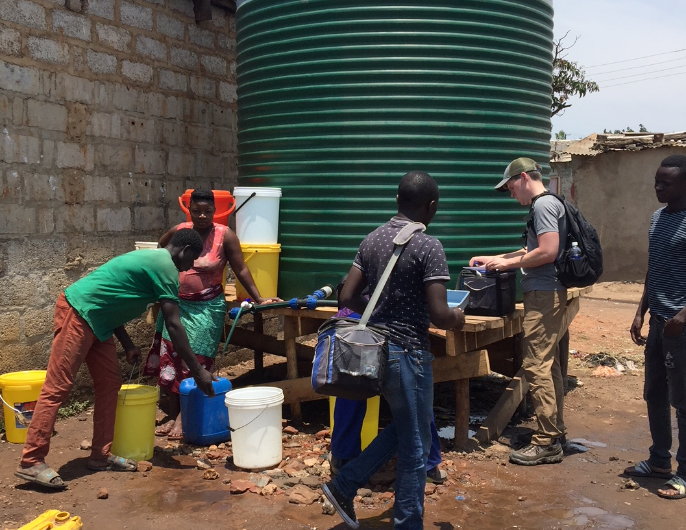Global Water, Sanitation, and Hygiene Epidemiology Team
The lead global epidemiology unit for water, sanitation and hygiene-related disease in CDC’s National Center for Emerging and Zoonotic Infectious Diseases.
Mission: Providing expertise and interventions aimed at saving lives and reducing illness by improving global access to and use of healthy and safe water, adequate sanitation, and improved hygiene.
Our Global Water, Sanitation, and Hygiene (WASH) Epidemiology Team has two focus areas:
Global WASH:
- Making water safe to drink and use
- Improving hygiene and sanitation
- Educating and training about global WASH
Global Waterborne Infections:
- Preventing, detecting, and controlling waterborne diseases
- Responding to outbreaks of waterborne diseases
- Identifying and characterizing the burden of waterborne diseases
- Providing guidance on case management procedures for epidemic waterborne diseases

CDC staff testing free chlorine residual levels from an emergency drinking water tank in Lusaka, Zambia during an outbreak of Cholera in 2018.
Our team:
- Conducts laboratory and field evaluations to identify effective, feasible, and scalable methods for:
- Household water treatment and safe water storage (including the CDC-developed Safe Water System)
- Hand hygiene (including local production of alcohol-based hand rub and management of handwashing stations)
- Sanitation (including collection, safe storage, and treatment of fecal waste)
- Conducts district-wide needs assessments of healthcare facilities to identify gaps in WASH coverage that inform how CDC and partners implement interventions.
- Uses behavioral science to identify barriers and motivators to adopt and sustain health behaviors, such as hand hygiene.
- Studies the burden, and when applicable, antimicrobial resistance patterns of diarrheal waterborne diseases in different places and populations through the Global Enterics Multi-Center Study (GEMS), the Vaccine Impact on Diarrhea in Africa (VIDA) Study, the Enterics for Global Health (EFGH)-Shigella study , and other research and public health activities.
- Examines the health benefits of proper use of water for hygiene and food and beverage preparation.
- Responds to outbreaks of cholera and typhoid fever and supports outbreak prevention and control measures in collaboration with international partners, such as Ministries of Health, the World Health Organization, and other CDC programs.
- Works with CDC’s Global Immunization Division and external partners, including UN Agencies and ministries of health, to integrate the use of cholera and typhoid fever vaccines into outbreak response and the prevention of endemic disease.
- Studies the associations between WASH and waterborne disease, antimicrobial resistance, and other outcomes.
- Develops model programs and materials and conducts trainings to build capacity among public health staff and promote community health.